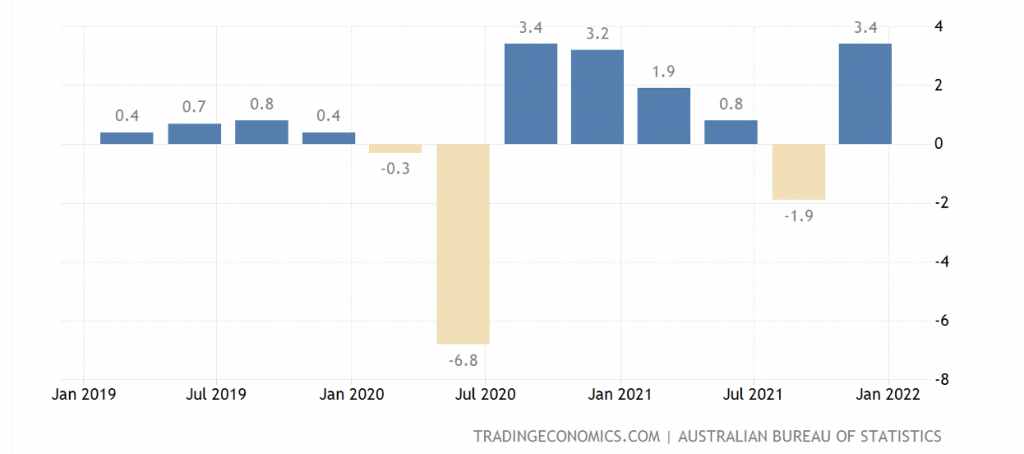

Data out yesterday showed that the Oz economy grew the fastest it has grown since the first quarter in 1976, which was just after Gough Whitlam was given the boot in late 1975 as Prime Minister. And to quote another blast from the leadership past i.e. Ronald Reagan, when it comes to growth here, “you ain’t seen nothing yet”.
Well, that’s what I would’ve said without fear but with floods and the Putin war, the potential for a huge boom could be reduced.
The December quarter brought 3.4% economic growth, which is what happens when you release people from the ‘virus-created jail’ called a lockdown. The chance to get out and spend, especially on services, gives the economy an overdue shot in the arm.
The big quarter of relief spending by Aussies, which was bigger than the 3% predicted by economists, pushed the annual growth rate up to 4.2%. This is a huge number for Australia.
Economic growth

Helping this big growth result were Aussies desperate to spend. “Household consumption, which increased by 6.3 per cent, added 3.2 percentage points as shoppers could spend their pent-up savings,” the SMH’s Shane Wright and Jennifer Duke revealed. “A consumer-led surge in spending out of last year’s Delta-lockdowns recouped all of the economy’s coronavirus losses, but the recovery could be put at risk by Russia’s invasion of Ukraine and catastrophic flooding across Queensland and NSW.”
They point to Federal Treasurer Josh Frydenberg’s observations that “the difficult geopolitical environment and natural disasters may hit the nation’s strong recovery”.
Of course, flood-affected regions will pause in their spending as their residents cope with the realities of their losses, but eventually, insurance and government support payments, as well as reconstruction outlays to repair the damage, will actually help the economy grow even faster.
Also, the Russia-Ukraine war is pushing up the value of our exports, with commodity prices rising, which should actually add to economic growth over the rest of this year.
Overnight we saw the implication of the uncertainty created by the war, with the US central bank boss, Jerome Powell, telling Congress that he favoured a quarter-percent interest rate rise this month partly because of the geopolitical concerns stemming from Russia’s actions.
Not long ago, many economists expected a half-a-percent increase and one Fed President, James Bullard of the St. Louis Federal Reserve, said a one percent increase was needed to beat down US inflation!
All this big rate-rise talk was putting pressure on our Reserve Bank to come up with an earlier-than-expected interest rate rise, which I reckon will be put on the backburner now. This is good news for those deeply in debt with mortgages and should help spending going forward and therefore economic growth.
By the way, the oil price went over $US109 a barrel overnight and will keep the pressure on rising petrol prices, which are actually like an interest rate rise for many households.
Clearly, the shorter this war ends up being, the better it will be for our economy’s growth, the stock market and the people of Ukraine.